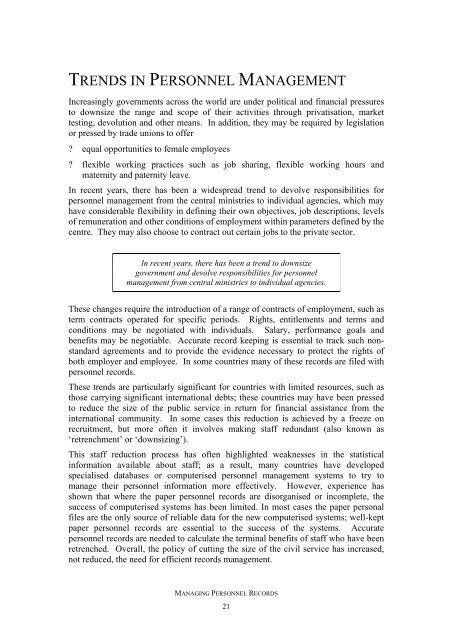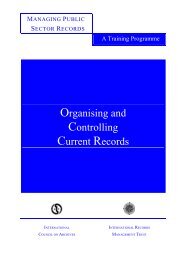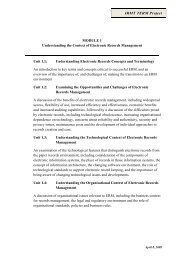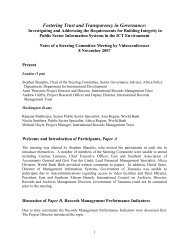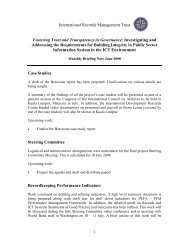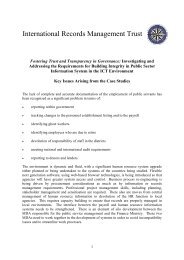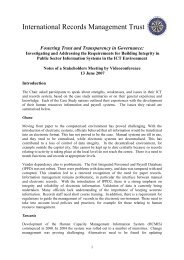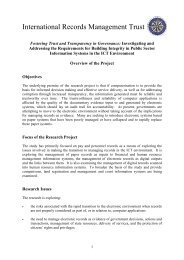Managing Personnel Records - International Records Management ...
Managing Personnel Records - International Records Management ...
Managing Personnel Records - International Records Management ...
Create successful ePaper yourself
Turn your PDF publications into a flip-book with our unique Google optimized e-Paper software.
TRENDS IN PERSONNEL MANAGEMENT<br />
Increasingly governments across the world are under political and financial pressures<br />
to downsize the range and scope of their activities through privatisation, market<br />
testing, devolution and other means. In addition, they may be required by legislation<br />
or pressed by trade unions to offer<br />
? equal opportunities to female employees<br />
? flexible working practices such as job sharing, flexible working hours and<br />
maternity and paternity leave.<br />
In recent years, there has been a widespread trend to devolve responsibilities for<br />
personnel management from the central ministries to individual agencies, which may<br />
have considerable flexibility in defining their own objectives, job descriptions, levels<br />
of remuneration and other conditions of employment within parameters defined by the<br />
centre. They may also choose to contract out certain jobs to the private sector.<br />
In recent years, there has been a trend to downsize<br />
government and devolve responsibilities for personnel<br />
management from central ministries to individual agencies.<br />
These changes require the introduction of a range of contracts of employment, such as<br />
term contracts operated for specific periods. Rights, entitlements and terms and<br />
conditions may be negotiated with individuals. Salary, performance goals and<br />
benefits may be negotiable. Accurate record keeping is essential to track such nonstandard<br />
agreements and to provide the evidence necessary to protect the rights of<br />
both employer and employee. In some countries many of these records are filed with<br />
personnel records.<br />
These trends are particularly significant for countries with limited resources, such as<br />
those carrying significant international debts; these countries may have been pressed<br />
to reduce the size of the public service in return for financial assistance from the<br />
international community. In some cases this reduction is achieved by a freeze on<br />
recruitment, but more often it involves making staff redundant (also known as<br />
‘retrenchment’ or ‘downsizing’).<br />
This staff reduction process has often highlighted weaknesses in the statistical<br />
information available about staff; as a result, many countries have developed<br />
specialised databases or computerised personnel management systems to try to<br />
manage their personnel information more effectively. However, experience has<br />
shown that where the paper personnel records are disorganised or incomplete, the<br />
success of computerised systems has been limited. In most cases the paper personal<br />
files are the only source of reliable data for the new computerised systems; well-kept<br />
paper personnel records are essential to the success of the systems. Accurate<br />
personnel records are needed to calculate the terminal benefits of staff who have been<br />
retrenched. Overall, the policy of cutting the size of the civil service has increased,<br />
not reduced, the need for efficient records management.<br />
MANAGING PERSONNEL RECORDS<br />
21


